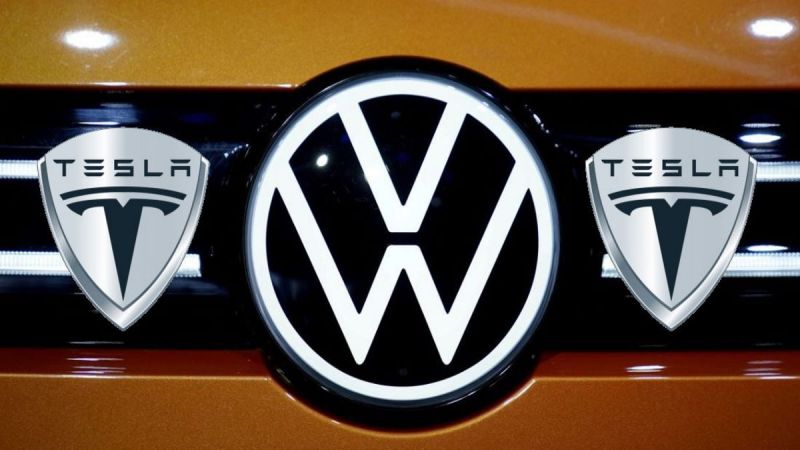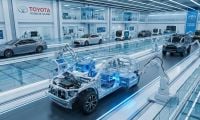Tesla: 12,000 workers make 500,000 cars.
Volkswagen: 25,000 workers make 700,000 cars.
This is why Volkswagen is worried. https://t.co/mSUKoRCoMN— David Ferris (@DavidFerris) October 13, 2021
Tesla Worker Efficiency
We have some news of the efficiency of Tesla -vs- VW in terms of how many workers can make how many cars in Germany, according to a Reuters.com article. Let's see what the number say:
In Germany:
Tesla will produce 500,000 cars with 12,000 workers
VW will produce 700,000 cars with 25,000 workers
Let's do some simple math.
Tesla will produce (500,000 / 12,000) or 41.66 cars per worker
VW will produce (700,000 / 25,000) or 28 cars per worker
In terms of efficiency, Tesla is about 33% more efficient in producing vehicles per worker (28 / 41.66). This is a HUGE problem for VW. Let's do some simple math on dollars here:
The Economics of Tesla's Efficiency
Let's assume each worker makes $50,000 a year. This is less than the 2018 Median salary for a Tesla employee as reported by Business Insider.
Now for Tesla, they are paying (12,000 * $50,000) or $600,000,000 in salary per year to make those Giga Berlin vehicles (once volume production is reached of course).
VW is paying (25,000 * $50,000) or $1,250,000,000 for their workers, assuming competitive salaries for each company. That's double what Tesla is paying for close to the same number of cars.
Let's break it down to be even simpler. Let's see what it costs to make 1 car for Tesla and VW from its work force:
If it costs Tesla $600 million to make 500,000 vehicles in a year, then we can do some simple math and realize that it costs Tesla ($600,000,000 / 500,000) or $1,200 to make 1 vehicle using its work force in Germany per year.
If it costs VW $1.25 billion to make 700,000 vehicles in a year, then we do the math ($1,250,000,000 / 700,000) and realize that it costs VW about $1,786 to make 1 vehicle using its work force in Germany per year.
If you do the math here, it works out to once again, Tesla being 33% more cost effective with its work force to make vehicles. The numbers really do add up. If each company produces 1 million vehicles per year, let's look at what it costs each to do so from their work force:
Tesla: $1,200 * 1,000,000 = $1,200,000,000 or $1.2 billion.
VW: $1,786 * 1,000,000 = $1,786,000,000 or $1.786 billion.
When 1 million vehicles are produced, which Tesla will do from Giga Berlin - in fact, they will reach 2 million or more, that difference of $586 million dollars per million vehicles will have a dramatic effect on the bottom line of each company. Imagine Tesla keeping that $586 million and having it go to the bottom line and earnings per share. What a big boost for Tesla's stock.
On the other hand, for VW, the extra $586 million in expenses will greatly affect its bottom line and earnings per share, meaning its stock will not be as profitable.
When There is a Large Scale, Efficiency and Cost Savings Matter
I think we've learned from this mathematical exercise that efficiency and cost savings matter. The larger the scale, the more they matter. Best to start being efficient and saving on cost while the company is small so you don't have to build up this culture later on.
Tesla will keep getting more and more efficient. That's why I don't think anyone is going to catch up to them anytime soon. Even if VW gets as efficient as Tesla is per 1,000,000 cars, Tesla will find a way to reduce costs further by that time and will likely maintain their 33% lead for decades to come.
I can only see a potential threat to Tesla happen once the EV market is saturated and there isn't as much of a need to innovate on new products. What will happen then? What will happen when Elon Musk leaves Tesla?
Leave your comments below, share the article with friends and tweet it out to your followers.
Jeremy Johnson is a Tesla investor and supporter. He first invested in Tesla in 2017 after years of following Elon Musk and admiring his work ethic and intelligence. Since then, he's become a Tesla bull, covering anything about Tesla he can find, while also dabbling in other electric vehicle companies. Jeremy covers Tesla developments at Torque News. You can follow him on Twitter, Facebook, LinkedIn and Instagram to stay in touch and follow his Tesla news coverage on Torque News.
Set as google preferred source











